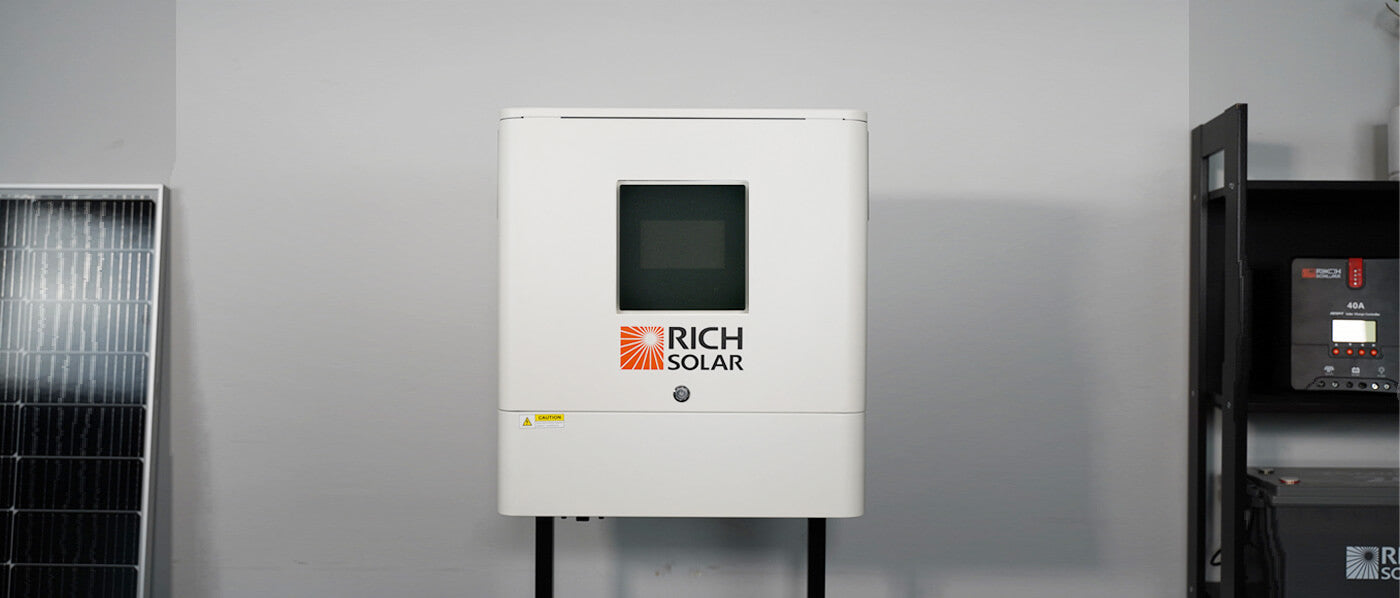As we shift towards renewable energy, the need for efficient and sustainable solutions becomes increasingly critical. One of the most innovative and effective options available today is the hybrid solar system. By seamlessly combining solar inverters and battery storage systems, these devices revolutionize how we capture, store, and use solar energy.
This transformative technology maximizes energy efficiency and ensures a reliable power supply, even when the sun isn't shining. Let's delve deeper into the world of hybrid inverters and explore how they’re changing the landscape of renewable energy.
What is a Hybrid Inverter?
A hybrid inverter combines a regular solar inverter and a battery inverter. Unlike traditional solar inverters that convert direct current (DC) from solar panels into alternating current (AC) for immediate use, these hybrid inverters also handle excess solar energy in batteries for future use.
Comparison with Traditional Solar Inverters
Traditional solar inverters can only convert DC to AC and feed power straight into the home or electrical grid. Since these inverters cannot store excess power, any surplus electricity generated during peak solar hours is returned to the grid, generally at a reduced compensated rate. On the other hand, hybrid inverters enable more efficient energy consumption by storing excess power in batteries, making any excess power available during power outages.

How Hybrid Inverters Work
To understand a hybrid inverter, we first need to grasp several important concepts in electricity.
Inverters
An inverter is a device that converts DC (direct current) power into AC (alternating current) power. In solar systems, this conversion is essential for running lamps, appliances, and other electronics, as AC is the standard power form in homes and businesses.
Direct Current vs Alternating Current
DC is a current that flows in one direction, while AC alternates its flow back and forth many times per second. Inverters use a process called pulse width modulation (PWM) to convert DC to AC. PWM works by rapidly turning the DC current on and off, making the average voltage output equivalent to AC. This conversion happens within microseconds, and the AC power is then distributed to power your home or business appliances.
Going in the Other Direction
To convert AC back into usable DC power, a rectifier is needed. A rectifier, the inverse of an inverter, converts AC into pulsing DC, which can be stored in system batteries. This conversion process is known as rectification.
The Hybrid Inverter
A hybrid inverter combines the functions of both an inverter and a rectifier. It can convert DC power from solar panels to AC power for use in your home and convert AC power from the grid to DC power for battery storage.
Battery Energy Storage
Batteries store DC power, which is produced by solar panels. Inverters convert this DC power to AC for home or business use and can charge batteries by directing excess energy to storage rather than immediate use. In the event of a grid outage or poor weather conditions, inverters switch to battery power automatically. If sunlight is insufficient and battery power is low, the hybrid inverter can pull AC power from the grid to charge the DC batteries.
The beauty of the hybrid inverter lies in its seamless integration of solar power generation, battery storage, and backup power into one unit, making it an ideal solution for anyone looking to streamline their solar setup for home or business.
Components of a Hybrid Inverter System
A hybrid inverter system consists of several key components that work together to provide a comprehensive energy solution:

Solar Panels
Solar panels are the primary source of renewable energy, producing direct current (DC) electricity from the sun. The total energy-generating capacity of the system is determined by the quantity and quality of solar panels.
Battery Storage
Excess solar energy produced during the hours of maximum sunlight is stored in solar batteries. By using this stored energy at off-peak times, you may lessen your need on the grid and have a constant power source.
Inverter Unit
The hybrid inverter is the system's main component, which turns DC power from solar panels and batteries into AC for home usage. It also controls the charging and draining of the batteries.
Monitoring and Control Systems
Advanced monitoring systems enable users to monitor generation, use, and storage space in real-time. These systems usually include mobile applications or online interfaces that provide insights as well as control over the energy management system.
Benefits of Hybrid Inverters
Hybrid inverters offer numerous advantages, making them an appealing choice for modern energy needs. Their innovative design and functionality ensure efficient and reliable power management, catering to the growing demand for sustainable and cost-effective energy solutions.

Increased Energy Independence
Hybrid inverters like the NOVA 6500-S reduce grid reliance by integrating solar power generation with battery storage. This independence enables a consistent power supply even during outages or in distant places with intermittent grid connectivity.
Improved Energy Efficiency
Hybrid inverters improve energy efficiency by storing extra solar electricity and reducing waste. Unlike traditional inverters, which only convert DC power to AC for immediate use, hybrid inverters also store surplus energy. This dual functionality prevents energy waste and ensures a continuous power supply. The enhanced efficiency of hybrid inverters leads to cheaper power costs and a smaller carbon imprint, making them an eco-friendly and cost-effective solution for modern energy needs.
Enhanced Reliability and Backup Power during outages
In areas prone to power disruptions, hybrid inverters offer a dependable backup power source. During these interruptions, the system may effortlessly transition to battery power, ensuring an uninterrupted power source for places that need it.
Cost Savings and Potential Return on Investment
Investing in a hybrid inverter system offers significant long-term benefits. The savings on power bills and potential incentives for adopting renewable energy make it a valuable choice. Additionally, hybrid and other solar systems can increase property values thanks to their environmental sustainability and energy efficiency. By integrating solar power generation, battery storage, and backup power into one seamless unit, hybrid inverters provide a reliable, cost-effective, and eco-friendly energy solution for homes and businesses.
Types of Hybrid Inverters
Hybrid inverters come in two main types, each with its unique features and applications:

AC-Coupled Hybrid Inverters
AC-coupled hybrid inverters are powered by the electrical system's alternating current. They’re often easier to adapt to existing solar systems since they use the same alternating current (AC) energy as the dwelling. These types of inverters are suitable for adding battery backup to an existing solar system.
DC-Coupled Hybrid Inverters
DC-coupled hybrid inverters are wired directly to the DC side of solar panels and batteries. This configuration is typically more efficient since it reduces the amount of energy conversions needed, resulting in smaller energy losses. DC-coupled systems are ideal for new installations that are built from the ground up for maximum efficiency.
Differences and Suitable Applications
AC-coupled systems are superior for converting existing solar installations, but DC-coupled systems are economical for new installations. The decision between the two is determined by the user's demands and circumstances.
Considerations for Choosing a Hybrid Inverter
Before choosing a hybrid inverter, consider several important factors to ensure it meets your specific needs. Proper evaluation will help in selecting a system that is efficient, cost-effective, and suitable for your household's energy requirements.

Energy Needs and Consumption Patterns
Understanding your household's energy requirements and consumption patterns is critical for calculating the size and capability of the hybrid inverter system. This involves examining daily and seasonal energy use and making sure the system can fulfill consumption demands.
Budget and Cost Implications
A hybrid inverter system might have a substantial upfront cost. The whole expenditure, including installation and maintenance expenses, should be weighed alongside potential savings and advantages in the long run.
Compatibility with Existing Solar Systems
For homes with existing solar power systems, it is critical to select a hybrid inverter that works with the existing system. This guarantees a smooth integration while avoiding unnecessary expenditures or hassles.
Future Scalability and Expansion
Planning to meet future energy demands is necessary. A customizable hybrid inverter system allows users to do upgrades if needed. You can add more solar panels or expand battery storage, to meet rising energy demand.
FAQs
What is the main advantage of a hybrid inverter over a traditional solar inverter?
The main advantage of a hybrid inverter is its ability to store excess solar energy in batteries for later use, providing greater energy independence and efficiency.
Can I add a hybrid inverter to my existing solar panel system?
Yes, AC-coupled hybrid inverters are designed for easy retrofitting into existing solar installations.
How long do the batteries in a hybrid inverter system last?
The lifespan of batteries varies depending on the type and usage, but modern batteries last between 5 to 15 years.
Are hybrid inverters suitable for off-grid applications?
Yes, hybrid inverters are best for off-grid applications as they provide reliable power storage, ensuring a continuous power supply during power interruptions.
Do hybrid inverters require maintenance?
Like any other electrical system, hybrid inverters require regular maintenance to ensure optimal performance. Regular checks and servicing can help extend the lifespan of the system.
Hybrid inverters provide an effective way to store solar energy and manage power storage. Their capacity to offer constant power supply, even during power interruptions, makes them a perfect choice for both residential and commercial usage. Understanding hybrid inverters allows prospective users to make a wise selection that promotes energy independence and efficiency.

